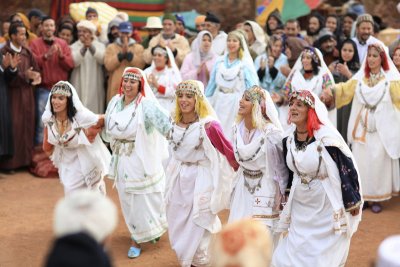Reviews - The Source
The Source
Reviewed By John Stakes

The Source
Film crews these days can turn up almost anywhere but the real village life location for last Sunday’s 2011 comedy-drama by Romanian born Radu Mihaileanu was to be found somewhere high up in the maghreb mountain region twixt Tunisia and Cairo. Our only clue to its precise location was that it could be reached by adventurous tourists which was just as well because drought had decimated the farming economy and the only source of income lay in their fleecing. The only source of water was now a small stream overlooking the village. Why choose such a remote spot?
Again in real life this particular village had apparently lacked its own piped water supply until but four years before the crew arrived, so water had to be shoulder yoke-carried down the steep mountain track usually by the womenfolk. The setting was thus ideal for a story in which the women sought to improve their lot by pressing for piped water to be brought to the village by the men. But how could they be persuaded to roll up their sleeves and forego their endless tea drinking sessions? The inspiration for the women’s means of persuasion lay in another recent true story revealed in a French publication “La Liberation” about a Turkish village where the women had decided, in time honoured “Lysistrata” style, to withhold sexual favours until their men-folk did their bidding.
This reworking of the centuries-old battle of the sexes story also had a very modern political and social dimension currently found in the attempted emancipation or at least empowerment of Moslem women across North Africa. Social observation is familiar territory for Mihaileanu. Members will recall his 2009 film “The Concert” about old Jewish and gypsy musicians who journeyed to Paris to replace the Los Angeles Philharmonic orchestra who had cancelled their performance at the last minute.
Mihaileanu’s task here was to decide how to balance the obvious seriousness of the issues surrounding female empowerment and the humorous potential in their collective decision to engage in sexual bribery. In the film’s construction, the political considerations were confined to the sub-plotting with the sexual shenanigans taking centre stage with a touch of Arabian Nights ambiance. The medicine was helped down with a spade-full of sugar. The wives were all gorgeous, led by Leila Belchti (a “global ambassador” for L’Oreal apparently) as Leila, the wife of Salch Bakri’s Sami, whose matriarchal mother Fatima was none other than “The Visitor” and “Lemon Tree” heroine Hiam Abbass. Leila’s perseverance was maintained through the support of “Mother Rifle”, a feisty old woman portrayed in scene-stealing manner by Biyouana.
No sooner had we been introduced to the many and varied issues surrounding the place of both men and women in both their local community and in a wider changing world than we were regaled with brightly costumed song and dance routines. Whilst giving the film a sort of Moroccan Mamma Mia like vitality, they tended to deflect and dilute the starker reality of the wider plight of the women and were deployed mainly for comic effect when the tourists were falsely informed that the lyrics praised their arrival.
Mihaileanu was content to ventilate rather than to explore the deeper issues and so was able to round off his cinematic confection rather more readily than had reality been allowed to bite with its customary venom. By presenting us with what has been described by others as “humanist couscous” Mihaileanu introduced perhaps too many ingredients for his North African hotpot but the whole was redeemed by some ravishing landscapes and spirited performances from an experienced cast at home in their stereotypical roles. Apparently they were all required to deliver their lines in a melodic Moroccan dialect (Darijia) which the director himself chose not to learn! The extras were drawn from the village and many tasted their first experience of western culture when attending the film’s first screening at the 2011 Cannes Film Festival. It would be interesting to learn of their first and any lasting impressions!
Back in Keswick another large and appreciative audience warmed to the characters and sun-kissed landscapes, voting it amongst the most popular of the current season. Whilst the whole may not have been greater than the sum of the individual parts the film had an undeniably infectious quality throughout and never flagged.
For next Sunday’s film the wilderness again beckons as we venture into the barren Turkish Steppes region for celebrated Turkish director Nuri Bilge Ceylan’s 2011 “Once Upon a Time In Anatolia”. The problem to be solved here is not the lack of running water however….but a dead body!
Again in real life this particular village had apparently lacked its own piped water supply until but four years before the crew arrived, so water had to be shoulder yoke-carried down the steep mountain track usually by the womenfolk. The setting was thus ideal for a story in which the women sought to improve their lot by pressing for piped water to be brought to the village by the men. But how could they be persuaded to roll up their sleeves and forego their endless tea drinking sessions? The inspiration for the women’s means of persuasion lay in another recent true story revealed in a French publication “La Liberation” about a Turkish village where the women had decided, in time honoured “Lysistrata” style, to withhold sexual favours until their men-folk did their bidding.
This reworking of the centuries-old battle of the sexes story also had a very modern political and social dimension currently found in the attempted emancipation or at least empowerment of Moslem women across North Africa. Social observation is familiar territory for Mihaileanu. Members will recall his 2009 film “The Concert” about old Jewish and gypsy musicians who journeyed to Paris to replace the Los Angeles Philharmonic orchestra who had cancelled their performance at the last minute.
Mihaileanu’s task here was to decide how to balance the obvious seriousness of the issues surrounding female empowerment and the humorous potential in their collective decision to engage in sexual bribery. In the film’s construction, the political considerations were confined to the sub-plotting with the sexual shenanigans taking centre stage with a touch of Arabian Nights ambiance. The medicine was helped down with a spade-full of sugar. The wives were all gorgeous, led by Leila Belchti (a “global ambassador” for L’Oreal apparently) as Leila, the wife of Salch Bakri’s Sami, whose matriarchal mother Fatima was none other than “The Visitor” and “Lemon Tree” heroine Hiam Abbass. Leila’s perseverance was maintained through the support of “Mother Rifle”, a feisty old woman portrayed in scene-stealing manner by Biyouana.
No sooner had we been introduced to the many and varied issues surrounding the place of both men and women in both their local community and in a wider changing world than we were regaled with brightly costumed song and dance routines. Whilst giving the film a sort of Moroccan Mamma Mia like vitality, they tended to deflect and dilute the starker reality of the wider plight of the women and were deployed mainly for comic effect when the tourists were falsely informed that the lyrics praised their arrival.
Mihaileanu was content to ventilate rather than to explore the deeper issues and so was able to round off his cinematic confection rather more readily than had reality been allowed to bite with its customary venom. By presenting us with what has been described by others as “humanist couscous” Mihaileanu introduced perhaps too many ingredients for his North African hotpot but the whole was redeemed by some ravishing landscapes and spirited performances from an experienced cast at home in their stereotypical roles. Apparently they were all required to deliver their lines in a melodic Moroccan dialect (Darijia) which the director himself chose not to learn! The extras were drawn from the village and many tasted their first experience of western culture when attending the film’s first screening at the 2011 Cannes Film Festival. It would be interesting to learn of their first and any lasting impressions!
Back in Keswick another large and appreciative audience warmed to the characters and sun-kissed landscapes, voting it amongst the most popular of the current season. Whilst the whole may not have been greater than the sum of the individual parts the film had an undeniably infectious quality throughout and never flagged.
For next Sunday’s film the wilderness again beckons as we venture into the barren Turkish Steppes region for celebrated Turkish director Nuri Bilge Ceylan’s 2011 “Once Upon a Time In Anatolia”. The problem to be solved here is not the lack of running water however….but a dead body!
Find A Film
Search over 1475 films in the Keswick Film Club archive.
Friends
KFC is friends with Caldbeck Area Film Society and Brampton Film Club and members share benefits across all organisations
Awards
Keswick Film Club won the Best New Film Society at the British Federation Of Film Societies awards in 2000.
Since then, the club has won Film Society Of The Year and awards for Best Programme four times and Best Website twice.
We have also received numerous Distinctions and Commendations in categories including marketing, programming and website.
 Talking Pictures
The KFC Newsletter
Talking Pictures
The KFC Newsletter
Links Explore the internet with Keswick Film Club


